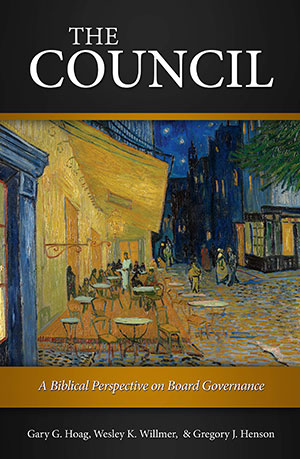
The Council by Gary G. Hoag, Wesley K. Willmer, and Gregory J. Henson (ECFAPress, 2018, $18).
In The Council, co-authors Gary G. Hoag, Wesley K. Willmer, and Gregory J. Henson promise to provide “a biblical perspective on board governance.” They intend to answer “What does the Bible say about board governance?” That’s a tall order, and I’m not sure the book quite fulfills these promises.
Their approach builds on selecting and comparing four councils described in the Bible — the good examples of the “Council of Moses” in Numbers 11 and “Council of Jerusalem” in Acts 15, and the bad examples of the Sanhedrin council and council of Ephesus. Later in the book, they also use the fourth-century Council of Arles as another good example. From this comparison of good and bad councils, the authors develop a list of biblical characteristics and then suggest that their list is a “biblical framework” that should inform board governance today.
There are a few problems with this approach. For example, focusing on Numbers 11 without looking at the following chapter, when everyone revolted against God, is troubling. Additionally, in both the Numbers and Acts accounts, the authors may be confusing (or conflating) what the Bible is describing with what it is prescribing. I wondered if stronger support for their list of principles and practices might result from additional thoughtful reflection on the teachings of Christ and the books of Acts, 1 Timothy, Titus, and James.
In the fifth chapter, the authors provide readers with four key principles that they see as a biblical framework for board governance:
- Abstain from wealth and status by choosing people with godly character and leadership gifts.
- Abstain from control and focus on humility, listening to one another and God.
- Abstain from idolatry to money by practicing responsible stewardship.
- Abstain from pride through prayer, fasting, peer accountability, and service.
The sixth chapter encourages readers to practice key disciplines that they argue emerge from their biblical research: regular exploration of the scriptures, silence before God, participation from everyone, and significant time spent in prayer. All of these seem like sound principles.
Even with the caveats above, I can recommend this book. A thorough discussion on how its four principles and four practices offered can guide board governance seems to me like a meaningful conversation on board development.